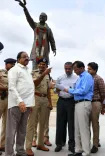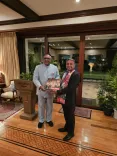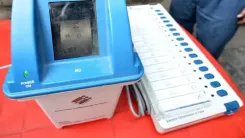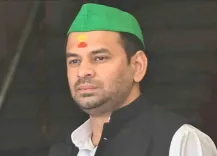How Can the World View India Differently?
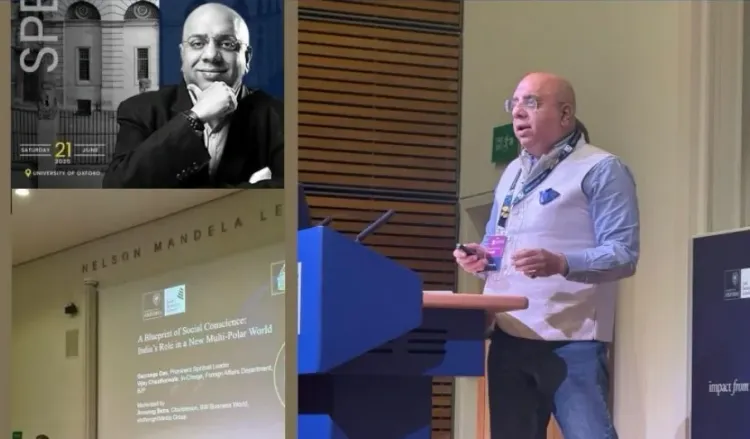
Synopsis
Key Takeaways
- India's rising geopolitical confidence is reshaping global narratives.
- Soft power through culture, such as Yoga and cinema, is gaining recognition.
- India's diaspora is a vital force in promoting Indian values globally.
- India's strategic diplomatic efforts are enhancing its global standing.
- Criticism of Western media highlights the need for balanced narratives.
London, June 23 (NationPress) The global powers must reconsider their perspective on India, acknowledging its emerging geopolitical assertiveness, cultural influence, and civilizational role as it seeks to craft a new global narrative, stated Annurag Batra, Chairman & Editor-in-Chief of BW Businessworld Media Group and Founder of exchange4media, during an event at Oxford University.
In a compelling address at the Oxford University’s Saïd Business School, Batra passionately discussed India’s escalating global significance and dominance. He emphasized the importance of “smelling the chai, not the coffee,” symbolizing India’s rise on the international stage, leaving the audience intrigued.
During a special event at Oxford’s renowned Nelson Mandela Lecture Theatre, Batra was accompanied by notable Indian figures such as spiritual leader Gauranga Das and Vijay Chauthaiwale, head of the BJP's Foreign Affairs Department.
Batra opened his remarks by sharing his love for chai, noting its role as a unifying element for families and communities, and suggested that it embodies the rich essence of a new India, a nation emerging as a global powerhouse, confidently facing both China’s dragon and America’s eagle.
The promoter and Editor-in-Chief of one of India’s oldest media outlets elaborated on India’s evolving global and economic landscape, stressing the necessity for the world to reassess the Indian subcontinent through a fresh lens.
“India is no longer a timid participant at the global gathering, previously satisfied with merely observing from the sidelines. Today, India enters the world arena with the assurance of a nation aware of its value,” he remarked.
“At the G7 summit, Prime Minister Narendra Modi emerges as the most sought-after guest, the leader everyone is eager to engage with. From Meloni to Macron, global leaders are keen on India’s perspective. Why? Because India is not just partaking in the game; it’s reshaping the rules. PM Modi has the unique ability to embrace Putin, share strategic moments with Trump, and engage in calculated discussions with Xi Jinping, all while prioritizing India’s interests without aligning with any side,” Batra explained.
Discussing Operation Sindoor, he noted that India’s decisive actions against nine terrorist camps across the Line of Control were not impulsive threats but rather a measured response that established a new standard in combating terrorism.
Highlighting India's focus on ‘atmanirbharata’ in all areas, including self-defense, he pointed out that following the tragic Pahalgam attacks, India acted independently to negotiate peace without waiting for international mediation, dismissing Trump's claims of halting warfare.
“This was not just diplomacy; it was a demonstration of sovereignty. India supported Trump’s Ukraine peace initiative, labelled Russia as its ‘sukh-dukh ka saathi’ (friend in joy and sorrow), and maintained communication with China despite previous border disputes—all while strengthening ties with the US through programs like the U.S.-India COMPACT and INDUS Innovation,” he stated.
Batra criticized Western media for its focus on sensationalism, arguing it often overlooks the genuine narrative of India, opting for sensational headlines to boost readership.
“Western media frequently misses the bigger picture. Outlets like CNN and BBC thrive on sensationalism—headlines designed for clicks. During India’s second COVID-19 wave in 2021, they fixated on funeral pyres and mourning families, creating a singularly chaotic portrayal,” he noted.
He pointed out the duplicity in Western media’s coverage of the COVID-19 pandemic, highlighting that while the US and Europe experienced vaccine hesitancy and slower rollouts, India’s vaccine efforts were depicted negatively.
Annurag Batra further discussed Yoga and cinema as facets of India’s soft power, which the global community has recently begun to recognize.
He emphasized that Indian professionals in engineering and technology are leading major global corporations, thereby significantly influencing global dynamics.
“Our diaspora, comprising 32 million individuals, acts as a global chaiwallah, embodying India’s spirit worldwide. From Sundar Pichai managing Google to Rishi Sunak influencing UK politics, they are pivotal change-makers,” he remarked.
Further elaborating on why the world should reassess its view of India, he remarked, “India has the capacity to ease tensions with Pakistan, foster relationships with China, collaborate with the US, all while hosting the Dalai Lama and promoting yoga globally. This is what defines India as a courageous and balanced nation that remains unapologetically authentic.”

